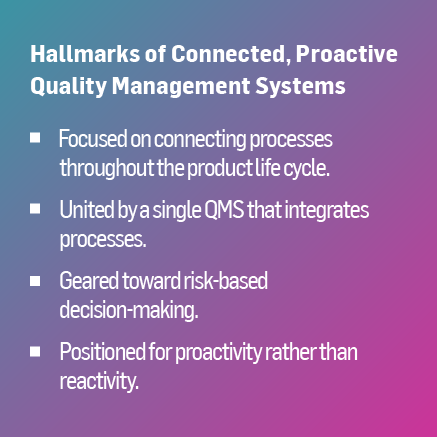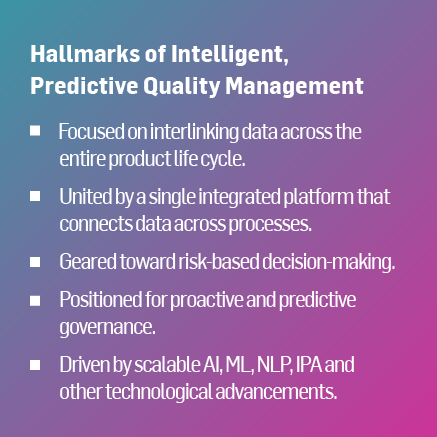How to Shift From Proactive to Predictive Quality Data Management

The reluctance to abandon conventional paper-based quality management systems (QMS) has long typified the life sciences industry’s approach to quality. Familiar yet inefficient quality models are shortsighted, however. And they’ve reduced proactive quality to a seemingly unattainable holy grail for many in the industry. Those unwilling to ditch systems rooted in paper documentation will continue to be stuck in a reactive quality stance. Such a position breeds inefficiency and document dependence.
Nonetheless, as quality management technologies and processes continue to improve, proactive quality practices are becoming more commonplace and will ultimately be the norm. Once considered luxuries that only the wealthiest organizations could afford, QMS solutions that foster proactive responses are quickly becoming accessible and necessary mechanisms for overcoming inefficiency. The familiarity of paper is giving way to the expediency of digitization. The result: accelerated quality processes and faster time to market.

Getting a Boost From Emerging Technologies
The race to keep up with quality’s rapid evolution is unending. And the industry is becoming exponentially more driven by and dependent on data. To compete, companies need a quality function that can respond dynamically. Quality teams need tools that unlock access to data that will enable them to do their jobs effectively.
Once again, technological advancements — this time in the form of artificial intelligence (AI), machine learning (ML), natural language processing (NLP), intelligent process automation (IPA) and similar emerging technologies — are redefining the industry’s quality models by offering means of achieving predictive quality data management capabilities. Life sciences organizations are becoming increasingly aware that these advanced technologies are going to be a competitive.
 Predictive Quality’s Next Phase
Predictive Quality’s Next Phase
Leading QMS providers are competitively researching new methods that will enable quality professionals to effectively and confidently capitalize on emerging technologies. Recent research projects underway at MasterControl are focused on incorporating advanced NLP, ML/AI and process automation to accelerate common quality processes. Some of the key MasterControl QMS functionalities to which advanced technologies are being applied include:
- Creating Netflix-style contextual search and recommendation engines to improve search speed and accelerate the retrieval of relevant information and documents based on users’ past searches and search language history while also refining the recommendations it provides over time.
- Automating text extraction from unstructured documents, identifying and contextualizing the relevant data that is gathered, and auto populating that information into forms, thereby enhancing efficiency and accuracy.
- Streamlining tasks involved in workflow creation and execution to enable users to effortlessly connect systems, data sources and process steps.
The Road Ahead for Predictive Quality
The dream of converting product quality data into predictive insights and real-time intelligence is becoming the new reality, thanks to relentlessly advancing technology. And it is gaining more relevance every day as indicated by the industry executives and quality managers recently surveyed by Boston Consulting Group. More than 60% of respondents think predictive analytics will significantly impact quality performance and bottom lines within the next five years, compared to the 16% who gauge the impact as presently significant.(2)
With the promise of truly predictive analytics, new paths are opening for organizations to move beyond quality data that is limited to reactive and proactive uses. Emerging technologies are proving they can enhance companies’ capacity to anticipate and prevent quality problems, prompt actions before thresholds are hit, and validate hypotheses and root causes of quality events faster.
Contact Enterey Today
Enterey's team of life science consultants helps organizations implement industry-leading best practices to optimize compliance and efficiencies across their operations. Contact us today to learn more. Be sure to download our free Project Portfolio Management Tool to identify critical reasons why your projects may not be aligned with your strategic vision.
References
- “Advance Quality Performance Through Data-Driven Insight,” CEB Quality Leadership Council (Gartner), Aug. 22, 2017.
- “Quality 4.0 Takes More Than Technology,” by Daniel Kupper, Claudio Knizek, Dave Ryeson and Jan Noecker, BCG, Aug. 20, 2019.
-1.png?width=266&height=69&name=Enterey_Color-Logo-withTag%20(1)-1.png)




